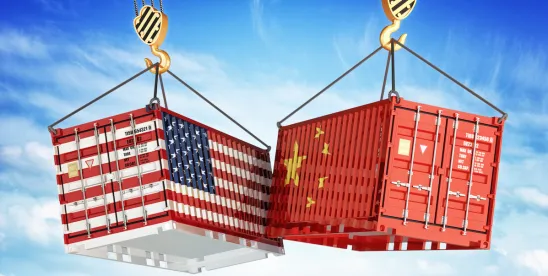The U.S. Department of the Treasury published its proposed rules on June 21 imposing restrictions on certain U.S. outbound investments involving China (including Hong Kong and Macau). These proposed rules come almost a year after President Joe Biden’s executive order instructing the Treasury Department to establish such a program targeting U.S. investments in China in certain categories of national security technologies and products.
Businesses and investors affected by these proposed rules should consider taking proactive measures in preparation for the final rules and also should consider submitting comments to the Treasury Department by the Aug. 4, 2024, deadline.
Summary of Proposed Prohibitions and Notification Requirements
As anticipated, the proposed rules would create two primary restrictions on U.S. outbound investments into China – prohibited investments and notification requirements and target three subsets of national security technologies and products:
- Semiconductors and microelectronics
- Quantum information technologies
- Certain artificial intelligence (AI) systems
The rules will cover a variety of investment activities by what they term “U.S. persons,” directly or indirectly, in China, such as acquisition of equity interest (including contingent interest); certain debt financing; greenfield investments or corporate expansions; joint ventures; and certain investments as a limited partner (LP).
Identifying indirect investments in China covered by the rules may present particular challenges. Under the rules, U.S. persons must prevent their “controlled foreign entities” from undertaking prohibited transactions in China or to notify the Treasury Department where required. Other non-China investments may also be affected, for instance, where a U.S. person invests in a non-China entity that in turn holds a specified interest in a Chinese entity involved in any of the activities of concern and derives more than 50 percent of its revenue, net income, capital expenditure, or operating expenses in or from that Chinese entity.
Questions of Interest to U.S. Investors
The proposed rules address certain questions U.S. investors may be asking in anticipation of and in preparing for the Treasury Department’s final rules.
What types of U.S. investments in China are prohibited transactions?
U.S. investments in China involving the following products and technology are prohibited:
- Electronic design automation software; certain fabrication and advanced packaging tools; the design, fabrication, or packaging of certain advanced integrated circuits; and supercomputers
- Development of quantum computers and production of critical components; the development or production of certain quantum sensing platforms; and the development or production of quantum networking and quantum communication systems
- Any AI system designed to be exclusively used for, or intended to be used for, military, government intelligence or mass surveillance end use; development of any AI system that is trained using a specified quantity of computing power
When are notifications required, and is it a “reverse CFIUS” process?
U.S. investments in China involving the following products and technology require notification to the Treasury Department:
- Design, fabrication, or packaging of integrated circuits not otherwise covered by the prohibited transaction definition
- Development of any AI system designed (but not exclusively) for military, government intelligence or mass surveillance or intended to be used for certain cybersecurity digital forensics tools, penetration testing tools, control of robotic systems; or is trained using a specified quantity of computing power (set below the levels in the prohibited transaction definition)
U.S. persons subject to the notification requirement must file a notification with the Treasury Department no later than 30 days after a transaction is completed, or no later than 30 days after gaining actual knowledge that an already-completed transaction would have been covered at the time of the transaction. The notification form requests that U.S. persons share certain information such as description of the U.S. person; the transaction and its financial details; the covered foreign person; and the covered technology, products and services.
The proposed rules do not instruct the Treasury Department to conduct a case-by-case review, distinguishing the outbound notification requirement from the Committee on Foreign Investment in the United States (CFIUS) review process. The department may contact U.S. notification filers, however, on an ad hoc basis with follow-up questions and requests.
What level of due diligence will be expected of U.S. investors under the rules?
The obligation to comply with these rules applies if a U.S. person has “knowledge” of relevant facts or circumstances related to a covered transaction. Knowledge includes not only actual knowledge, but also lower thresholds such as “substantially certain,” “awareness of a high probability,” and “reason to know.” In considering whether a U.S. person has knowledge, the Treasury Department may consider whether that U.S. person undertook a “reasonable and diligent inquiry.”
What types of investments may be “excepted” under the proposed rules?
The rules propose certain “excepted transactions” as follows:
- Publicly traded securities
- Certain LP investments
- Buyouts of country of concern ownership
- Intracompany transactions
- Binding commitments predating the executive order (i.e., those made prior to Aug. 9, 2023); certain syndicated debt financings
- Third country measures (i.e., U.S. investments in certain countries that impose similar outbound investment measures on China)
These exceptions qualify so long as they “do not afford a U.S. person certain rights that are not standard minority shareholder protections.”
At this time, the Treasury Department is contemplating how to limit the exception for certain LP investments below a specified threshold. For instance, it is considering an exception threshold where the LP’s committed capital in the investment fund does not exceed $1 million. It should be noted though that LP investments in China involving the covered activities are generally not excluded. Indeed, the proposed rules obligate an LP to determine, through “reasonable and diligent inquiry,” where its investment fund is likely to invest in terms of geography and sector to determine if the investment is a covered transaction.
The Treasury Department has also proposed a national interest exemption where a “U.S. person could seek an exemption from the application of the prohibition or notification on the basis that a transaction is in the national interest of the United States.”
How has the Treasury Department crafted the scope of covered AI technology?
The proposed rules broadly define the scope of “AI System” as (a) a machine-based system that can, for a given set of human-defined objectives, make predictions, recommendations, or decisions influencing real or virtual environments; or (b) any data system, software, hardware, application, tool, or utility that operates in whole or in part using such a system described in (a).
The proposed prohibitions and notification requirements on AI systems will be tied primarily to end uses. The details on how the Treasury Department will interpret and administer end use determinations are currently unclear. It is seeking comments on the specified end uses and computing thresholds of AI systems for prohibited and notifiable transactions.
What are the potential penalties for non-compliance?
The proposed rules set forth several categories of potential consequences for engaging in prohibited transactions or failing to notify the department when required:
- Civil Penalties: Fines as high as $368,136 (subject to annual inflationary adjustments), or twice the amount of the transaction, whichever is greater
- Criminal Penalties: Fines as high as $1 million , imprisonment of up to 20 years, or both
- Divestment: The Treasury Department may nullify, void, or otherwise require the divestment of any prohibited transactions






 />i
/>i

